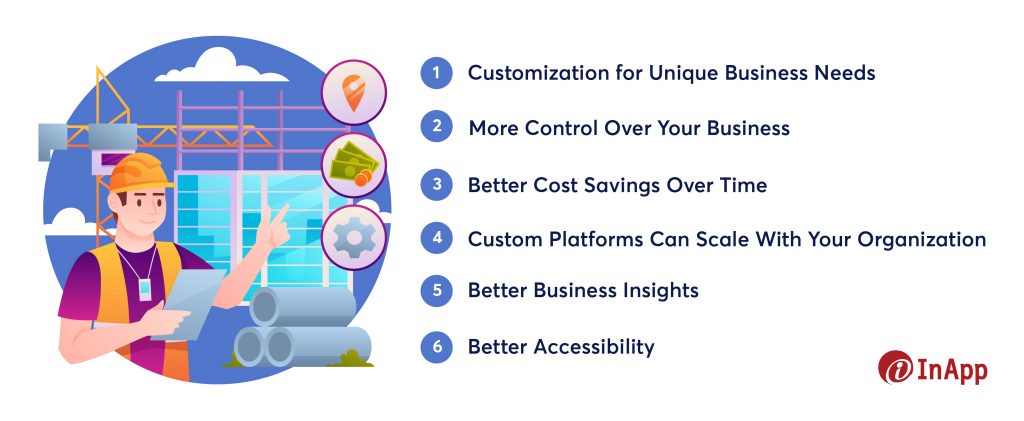Things are changing fast in the world of construction. Custom software platforms are becoming the go-to for many, serving up tailored solutions.
Think of your construction projects like puzzles. Lots of moving pieces, and different players, and sometimes it feels like you’re walking a tightrope. Why? Well, uncertainties, unique challenges, and the fact that every project is its beast.
As the industry adapts to the demands of the modern era, embracing custom software solutions is not just a choice but a pathway to unlocking advantages that redefine efficiency, collaboration, and success.
This blog is all about why custom software is your secret weapon in construction. From smoothing out project bumps to getting everyone on the same page, here are six reasons why custom software can be your construction crew’s new best friend.
Here are 6 Reasons Why Construction Companies Need Custom Software Development

1. Customization for Unique Business Needs
One of the most significant advantages of custom software is its ability to be tailored to meet the specific needs of a construction business. Off-the-shelf software solutions may offer a range of features, but they often fall short of addressing the unique challenges and workflows of construction companies.
Take, for example, a mid-sized construction firm that specializes in high-rise building projects. Their project management needs may differ significantly from a company focused on residential developments. With custom software, the construction company can collaborate with developers to create a platform that aligns seamlessly with their processes. This might include features such as specialized project tracking, resource allocation, and communication tools that cater specifically to the demands of high-rise construction.
The result is a software solution that not only meets the immediate needs of the business but also allows for future scalability and adaptability as the company grows and evolves.
2. More Control Over Your Business
Custom software grants construction companies greater control over their operations, enabling them to make swift and informed decisions. Unlike generic software that imposes predefined processes, custom solutions empower businesses to design workflows that align with their unique operational structure.
For instance, a construction company may want to integrate its custom software with Building Information Modeling (BIM) systems to enhance collaboration between architects, engineers, and construction teams. This level of control ensures that the software aligns perfectly with the company’s vision and facilitates a more efficient flow of information across the organization.
In addition, custom software allows for the seamless integration of third-party tools and technologies, providing construction companies with the flexibility to adopt innovations without being constrained by the limitations of off-the-shelf solutions.
3. Better Cost Savings Over Time
While the upfront cost of developing custom software may seem higher compared to purchasing off-the-shelf alternatives, the long-term savings can be substantial. Custom software is an investment that pays off in efficiency, reduced errors, and increased productivity.
Consider the cost of human errors in construction projects. Off-the-shelf software might not fully align with a company’s processes, leading to mistakes and inefficiencies that can result in costly rework. Custom software minimizes these errors by being specifically designed to meet the company’s requirements, reducing the likelihood of costly mistakes and project delays.
Moreover, as the company grows, custom software can easily scale to accommodate increased demand, reducing the need for frequent software replacements or upgrades. This scalability ensures that the initial investment continues to deliver value over time, making it a cost-effective choice in the long run.
4. Custom Platforms Can Scale With Your Organization
As construction companies expand and take on larger projects, their software needs must scale accordingly. Custom software offers the advantage of scalability, allowing companies to adapt their systems to handle growing volumes of data, users, and project complexity.
For example, a construction firm that starts with a focus on residential projects may later expand into commercial or industrial construction. Custom software can be designed to accommodate the unique requirements of each sector, ensuring a seamless transition and preventing the need for a complete overhaul of software systems.
5. Better Business Insights
Data is a valuable asset in the construction industry, providing insights that can drive strategic decision-making. Custom software allows construction companies to capture, analyze, and visualize data in ways that align with their specific business objectives.
For instance, custom project management software can be designed to collect data on project timelines, resource utilization, and budgetary information. With this data at their fingertips, construction companies can identify trends, optimize processes, and make informed decisions to improve overall efficiency and profitability.
6. Better Accessibility
In the construction industry, accessibility to critical information is paramount for effective decision-making. Custom software allows construction companies to create user interfaces that are intuitive and tailored to the needs of their teams, enhancing accessibility and usability.
For example, a construction project manager working on-site may need quick access to real-time project updates, resource allocations, and communication channels. Custom software can provide a mobile-friendly interface that allows on-site personnel to access the information they need from anywhere, improving communication and decision-making in real-time.
To Sum Up
The construction industry’s complex and diverse landscape demands innovative solutions to stay competitive and efficient. Custom software emerges as a vital tool, offering construction companies the flexibility, control, and tailored functionality needed to navigate the challenges unique to their operations.
Ready to make the move toward a more efficient, agile, and downright competitive future? Hit us up today! The first step to construction greatness is just a message away.
